|
|
 |
 |
 |
 |
 |
 |
|
|
John S. McCain III Biography |
 |
 |
 |
 |
|
|
|
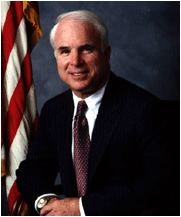
Throughout his public career, John McCain has been a leader in the most critical issues facing our country. He has waged a determined and often solitary campaign against pork barrel spending, fighting for ten years to pass a line item veto. He has been a persistent proponent of lower taxes, genuine deregulation and free trade. He has become one of Congress' most respected voices for a strong national defense, and for sound foreign policy and is considered one of the leading defenders of the rights of Native Americans .
John McCain has been an outspoken advocate for the reform of government institutions, and has fought and won to change a campaign finance system that favors the interests of a special few over the needs of the majority. Recently, millions of Americans rallied to John McCain's campaign for the presidency and to his cause of reforming the institutions of government and were inspired to fight for causes greater than their self interests.
John McCain was first elected to represent the state of Arizona in the U.S. House of Representatives in 1982. As a longtime admirer of Ronald Reagan, McCain was an early foot soldier in the Reagan Revolution. He served two terms in the House before being elected to the Senate in 1985. He was re-elected to a third Senate term in November 1998. In that election, he received nearly 70% of the vote, a total which included 65% of the women's vote, 55% of the Hispanic vote, and even 40% of the Democrats.
Senator McCain is Chairman of the Senate Committee on Commerce, Science and Transportation, and has in that capacity become a recognized leader on telecommunications and aviation issues, stressing the need to promote competition and government deregulation in the industries that are so important to the growth of our economy.
Senator McCain has received numerous awards from taxpayer and foreign policy organizations for his distinguished public service and conservative leadership. In 1997, he was named one of the "25 Most Influential People in America" by Time magazine.
The son and grandson of prominent Navy admirals, John McCain was born in the Panama Canal Zone in 1936. After graduating from the United States Naval Academy in 1958, McCain began a twenty-two year career as a naval aviator. In 1967, he was shot down over Vietnam and held as a prisoner-of-war in Hanoi for five and a half years (1967-1973), much of it in solitary confinement. He retired from the Navy as a Captain in 1981. McCain's naval honors include the Silver Star, Bronze Star, Legion of Merit, Purple Heart and Distinguished Flying Cross.
John McCain tells what he learned about life and honor from his father and grandfather, both four-star admirals in the U.S. Navy, in his best-selling family memoir, "Faith of My Fathers." The book, detailing McCain's early life and military career, spent 24 weeks on the New York Times "Best Sellers" list.
Senator McCain has seven children and four grandchildren. He and his wife, Cindy, reside in Phoenix.
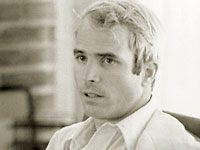
John McCain's 5 1/2 years of captivity in North Vietnam were divided into two phases. Early on, this son and grandson of high-ranking Naval officers was accorded relatively privileged status. Then he refused early release--which he saw as a public relations stunt by his captors--insisting that POWs held longer than him should be granted their freedom first. Thereafter, McCain was treated much more severely, but he also had an opportunity to bond with his fellow prisoners. Those experiences strengthened his resolve and eased his transition back into civilian life.
Lt. Comdr. John S. McCain III April 24, 1973
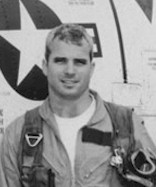
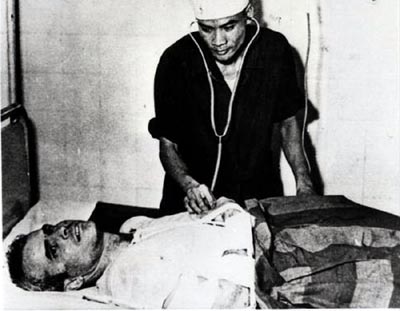
John McCain: Experiencing War - Library of Congress Video Interview
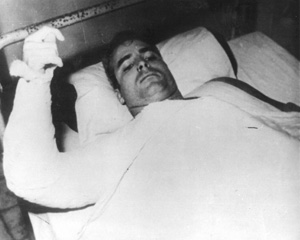
U.S. Navy Lt. Commander. John McCain (now a US Senator) suffered severe injuries in 1967 from bailing out of his A-4 over Hanoi and being beaten by a mob. A prize hostage because of his prominent father, he rejected offers of quick repatriation.
A Pentagon study provides new details--about bravery, torture, and endurance
--on the experience of American POWs in Vietnam .
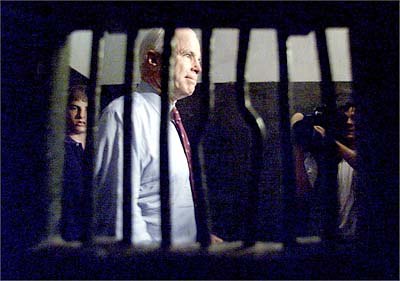
Senator John McCain and his son Jack paid a visit in April 2000 to what remains of the Hanoi Hilton. "It's always interesting for me to be back here and show my son the place where I lived for a long time," he said.
HANOI, Vietnam, April 26, 2000 -- As he strode through the shadowy hallways and incongruously sunny courtyards, gesturing here, pointing to a detail there, Senator John McCain might have been a father showing his son his alma mater.
Except the landmarks on this tour were dank cells like the one where Mr. McCain spent two years in solitary confinement, and leg irons, which he once wore as a punishment for insulting the guards.
"It's always interesting for me to be back here and show my son the place where I lived for a long time," the Arizona Republican said as he paused next to a faded photograph of himself as a grim-faced, unmistakably defiant inmate. "But I put Vietnam behind me when I left."
Yet, as he guided his wife and 13-year-old son through the remnants of the grim jail known as the "Hanoi Hilton , " Mr. McCain, long a proponent of better relations with Vietnam, betrayed feelings still raw a quarter of a century later.
"I still bear them ill will," he said of the prison guards, "not because of what they did to me, but because of what they did to some of my friends -- including killing some of them."
Mr. McCain and his wife, Cindy, had visited the prison, known as Hoa Lo, on one of his seven previous trips to Vietnam since his release in 1973. But Mr. McCain, whose visit comes just before the 25th anniversary on Sunday of the end of the Vietnam War, said he wanted to show his son Jack the place.
A sprawling French colonial-era fortress, the jail housed 300 American pilots at various periods during the war. The Vietnamese authorities tore down much of it in 1993 to make way for a luxury hotel and office complex called Hanoi Towers. But they preserved one corner as a museum.
Today, Mr. McCain seemed aware that the site had become just another stop on the tourist trail for people visiting Vietnam's now-popular capital. At several points during the self-guided tour he stopped to say hello or to have his picture taken with American tourists -- most of whom said they supported him during his unsuccessful campaign for the Republican presidential nomination this year.
He also offered an acidic commentary on how the Vietnamese portrayed life inside the prison. Alongside the pictures of Mr. McCain and his fellow prisoners, a plaque declared: "Though having committed untold crimes on our people, the American pilots suffered no revenge once they were captured and detained. Instead, they were treated with adequate food, clothing and shelter."
Shaking his head, Mr. McCain muttered, "That's entertainment."
Nearby, another set of photos showed the Americans receiving letters from their families, meeting with North Vietnamese journalists and attending Mass. Mr. McCain pointed out that one of the pilots photographed at Mass had placed his hand on his chin, with only his middle finger extended.
"I think that sums up how he felt about being here," Mr. McCain said.
Mr. McCain has described his five and a half year imprisonment as a nightmarish time, in which he was beaten and kept in solitary confinement. Twice he tried to hang himself, only to be cut down and assaulted by the guards.
Mr. McCain was captured on Oct. 26, 1967, after his Navy plane was shot down while on a bombing run over Hanoi. He parachuted into a lake, breaking both arms and a leg.
On Tuesday, Mr. McCain paid a visit to the lake, known as Truc Bac, where he described to reporters being dragged ashore and beaten by an angry mob. On this visit, several curious locals stepped forward to greet Mr. McCain -- some posing for photographs with his family.
In prison, Mr. McCain said the American inmates communicated by tapping on the walls of their cells. The prisoners nicknamed their cell-block Thunderbird, and Mr. McCain described how it was lighted with a single bulb. During the day, loudspeakers that hung from the ceiling would drone with music by North Vietnamese propaganda figures like the singer known as Hanoi Hannah. "I heard her every day," Mr. McCain said. "She's a marvelous entertainer. I'm surprised she didn't get to Hollywood."
The Vietnamese government has expressed anger at Mr. McCain's description of his treatment as a prisoner of war, especially in his recent memoir. Today, despite his sarcasm and fleeting bitterness, the senator seemed reluctant to add to his earlier accounts of that period.
Indeed, Mr. McCain has long advocated reconciling the two countries and was instrumental in the establishment of diplomatic relations with Hanoi five years ago. At his arrival here on Tuesday, he said he had come to "commemorate the beginning and continuation of a new relationship between the United States and Vietnam."
In meetings with senior Vietnamese officials, the senator said he discussed negotiations on a trade agreement between the two countries. A deal was agreed to in principle last July, but has bogged down since then as the Vietnamese have balked at several provisions.
Still, for this most celebrated of P.O.W.'s , the war is the shadow that lurks behind every meeting. On Tuesday, soon after he landed in Hanoi, Mr. McCain attended a ceremony on a sweltering airport tarmac, in which the remains of six people, believed to be American soldiers missing since the war, were loaded on an Air Force plane and flown to Hawaii for forensic analysis.
For Jack McCain, the visit seemed to confirm the stories his father had told him. As he left the prison, the young Mr. McCain said he had expected the cells to be cramped and dark. Indeed, his knowledge of the prison seemed so thorough that he expressed surprise at only one small detail: the iron doors at the main entrance were wide enough that his father was delivered through them in a truck.
By Mark Lander New York Times

|
|
|
|
|
|
 Vietnam War History
Vietnam War History
